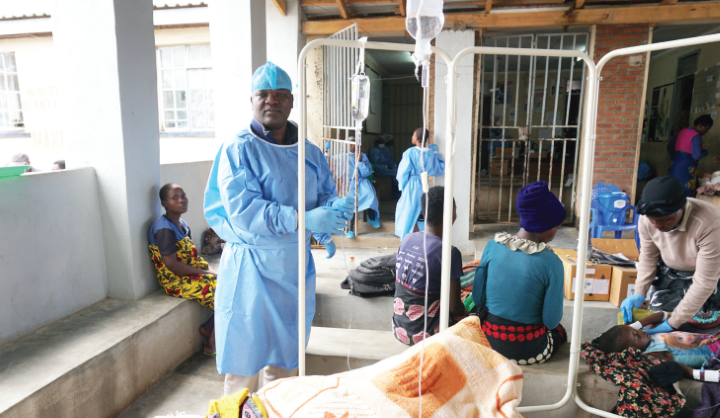Kulowa kufa community in dialogue
In times of HIV and Aids, communities that maintain such harmful cultural practices in the name of exorcising omens of death and bad luck are easily classified as primitive. Typical of the past 27 years, rural residents in Nsanje are used to a downpour of sermons from Aids activists from the nearest towns and beyond.
At worst, the honourable guests would come, take the test in confidential booths and proclaim themselves HIV-free before sitting at the high tables to wait for their turn to give their “brief remarks.†The only time the locals were heard out is when they gave testimonies, as did the 35-year-old Tembo last year.
But locals in her T/A Ndamera locality in Nsanje have strong feelings against being sermonised. Gone are the days when visitors were thought to be custodians of solutions to our problems, they say.
“Long speeches leave us helpless. They do not only give the misconception that the virus strictly targets the rural poor but also that we are voiceless receivers of the message from townspeople,†says another woman (name withheld because she is living with HIV and Aids) at Ntowe Trading Centre.
Against this realisation, awareness rallies organised by some Aids organisations, including Catholic Health Commission (Cahecom) of Chikhwawa Diocese, involve discussions where people break up into small groups to debate the possibility of a Malawi with lower HIV and Aids prevalence, currently estimated at 12 percent by the National Aids Commission (NAC).
As witnessed during an awareness rally at Ntowe Trading Centre on January 13, community dialogue involves various categories of the audienceâ€â€chiefs, people living with HIV and Aids (PLWHA), couples, clergy, traditional leaders and the youthâ€â€to discuss their challenges, roles and resolutions in helping the country get to zero new infections, stigma and Aids-related deaths.
It is amazing how openly the participants discussed issues that affect them when there is nobody to overshadow or underrate their thinking. The findings at the rally, funded by the Norwegian Church Aid, were equally revealing.
Women, who are usually voiceless on sex matters, openly spoke against practices that expose them to the virus. The youth, the worst hit group, share survival skills in the face of peer pressure, poverty and early marriages. PLWHAs reveal how they take part in public works despite being sidelined when it comes to relief items being distributed in the famished Shire Valley. Even T/A Ndamera, who insists that kulowa kufa is no longer practised, agrees with other traditional leaders that most harmful practices are outdated.
“Instead of addressing us as if we were uncivilised, organisations must take approaches that build on local knowledge and resources in the fight against HIV and practices that perpetuate its spread,†says T/A Ndamera.
The sentiments are echoed by Strachan Chisenga, Aids coordinator for the district where 14 of every 100 people are living with the virus. This is higher than the national rate.
“Community dialogue enables locals to ask themselves pertinent questions and find innovative ways of dealing with problems affecting them. This is especially vital now, when the world is striving to get rid of new infections, stigma and death due to HIV and Aids,†says Chisenga.
The district Aids coordinator thanks Cahecom and other NGOs for embracing participatory ways of complementing government’s efforts to reduce the spread and impact of the incurable disease.
Cahecom ex-officio member Father Francis Mpatsa says it is time Malawians accepted that the pandemic is real and started using a diversity of means to reduce the pressure it exerts on society.
The priest says the church-based organisation has been working together with home-based care groups since the 1990s. But what have they achieved so far?
“With the coming of ARVs, there are fewer bedridden patients than we had in the past two decades. This, coupled with home-based care services, awareness and support groups, has seen more and more people coming in the open to discuss HIV and Aids issues, declare their status, seek treatment and take part in eradicating stigma,†says Fr Mpatsa.
He hopes the inroads of community dialogue will improve the well-being in the country, where new infections pose a major threat even in the institution of marriage. This, he says, calls on people to be faithful, undergo test before marriage, and ensure pregnant women and their spouses get tested before childbirth.





